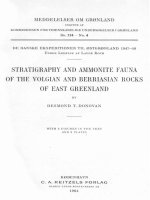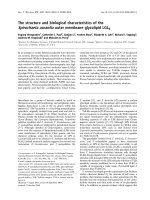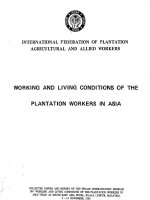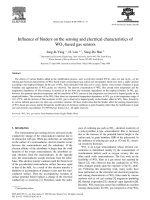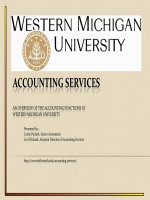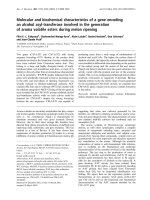Personal and professional characteristics of the academic personnel at hong duc university bases for staff development program
Bạn đang xem bản rút gọn của tài liệu. Xem và tải ngay bản đầy đủ của tài liệu tại đây (868.05 KB, 149 trang )
PERSONAL AND PROFESSIONAL CHARACTERISTICS OF THE
ACADEMIC PERSONNEL AT HONG DUC UNIVERSITY:
BASES FOR STAFF DEVELOPMENT PROGRAM
___________________________
A DISSERTATION
Presented to the Faculty of the Graduate School
Southern Luzon State University, Lucban, Quezon, Philippines
in Collaboration with
Thai Nguyen University, Socialist Republic of Vietnam
___________________________
In Partial Fulfillment
of the Requirements for the Degree
Doctor of Philosophy in Educational Management
___________________________
By
LAI VAN CHINH (TERRY)
October 2014
i
APPROVAL SHEET
The Dissertation of
LAI VAN CHINH
entitled
PERSONAL AND PROFESSIONAL CHARACTERISTICS OF THE
ACADEMIC PERSONNEL AT HONG DUC UNIVERSITY:
BASES FOR STAFF DEVELOPMENT PROGRAM
Submitted in Partial Fulfilment of the Requirements for the Degree
DOCTOR OF PHILOSOPHY IN EDUCATIONAL MANAGEMENT
A program offered by Southern Luzon State University,
Republic of the Philippines in collaboration with
Thai Nguyen University, Socialist Republic of Vietnam
has been approved by Oral Examination Committee
SUSANA A. SALVACION, PhD
Expert
APOLONIA A. ESPINOSA, PhD
Expert
RICARYL CATHERINE P. CRUZ, EdD
Expert
BELLA R. MUELLO, EdD
External Panel
CECILIA N. GASCON, PhD
Chairman
Endorsed by:
Recommended by:
CONRADO L. ABRAHAM, PhD
Adviser
SUSANA A. SALVACION, Ph.D.
Dean, Graduate School
Accepted in Partial Fulfilment of the Requirements for the Degree
Doctor of Philosophy in Educational Management
WALBERTO A. MACARAAN, Ed.D.
Vice President for Academic Affairs
_____________________
Date
ii
CERTIFICATE OF ORIGINALITY
iii
ACKNOWLEDGMENT
I wish to extend my sincerest gratitude to the following people who
provided valuable support and assistance for the success of my research
study:
Dr. Cecilia N. Gascon, President of the Southern Luzon State
University (SLSU)-Philippines, for linkaging with the Thai Nguyen University
(TNU)-Vietnam and offering the program on Doctor of Philosophy in
Educational Management, through the International Training Center-Thai
Nguyen University of Agriculture and Forestry (ITC-TUAF);
Dr. Dang Kim Vui, President of the TNU-Vietnam, for fostering the
SLSU-TNU linkage and its program offerings, through the ITC-TUAF;
Dr. Conrado L. Abraham, my research adviser, for his tireless
supervision and full support, which greatly helped me in completing my
graduate program and research work;
Prof. Nordelina B. Ilano, Director of the Office of International Affairs of
SLSU-Philippines, for her outright assistance to the Ph.D. students;
Dr. Tran Thanh Van, Dean of the Graduate School of TNU-Vietnam,
and Dr. Nguyen The Hung, Director of the International Training CenterVietnam, for their all-out support and encouragement for me to pursue my
studies;
To all the SLSU and TNU professors, who unselfishly shared their time,
knowledge and exprtise in the conduct of my graduate studies in the TNUVietnam; and
iv
Special thanks to my family and friends for their moral support and
encouragement, and for being my inspirations to succeed in my endeavor and
career.
Thank you so much to all of you!
Lai Van Chinh
v
TABLE OF CONTENTS
PAGE
TITLE PAGE ………………………………………………………………..
i
APPROVAL SHEET ……………………………………………………….
ii
CERTIFICATE OF ORIGINALITY ………………………………………..
iii
ACKNOWLEDGEMENT …………………………………………………..
iv
TABLE OF CONTENTS …………………………………………………..
vi
LIST OF TABLES ………………………………………………………….
viii
LIST OF FIGURE ……………………………………………………….....
x
LIST OF APPENDICES …………………………………………………...
xi
ABSTRACT …………………………………………………………………
xii
CHAPTER
I
II
III
INTRODUCTION
Introduction …………………………………………………..
1
Background of the Study …………………………………..
4
Objectives of the Study …………………………………….
7
Hypotheses of the Study ……………………………………
9
Significance of the Study …………………………………..
9
Scope and Limitation of the Study ………………………..
10
Definition of Terms ………………………………………….
11
REVIEW OF LITERATURE
Review of Literature ………………………………………..
14
Research Paradigm ……………………………...….………
31
METHODOLOGY
Locale of the Study ………………………….………………
33
Research Design …………………………….………………
34
Respondents of the Study …………………….……………
34
Research Instruments ……………………….…….…….….
34
Validation ……………………………………………………..
35
Data Gathering Procedure ………………………………….
35
vi
Statistical Treatment …….…………………………………..
35
IV
RESULTS AND DISCUSSIONS ……………………….….
39
V
SUMMARY, FINDINGS, CONCLUSIONS AND
RECOMMENDATIONS
Summary of Findings ……………………………………….
73
Conclusions …………………………………………………
76
Recommendations …………………………………………
78
REFERENCES ……………………………………………………………..
80
APPENDICES ……………………………………………………………...
85
CURRICULUM VITAE …………………………………………………….
135
vii
LIST OF TABLES
TABLE
PAGE
1
Scale of Values
38
2
Frequency and Percentage Distribution of the Respondents,
by Age
40
Frequency and Percentage Distribution of the Respondents,
by Gender
41
Frequency and Percentage Distribution of the Respondents,
by Civil Status
43
Frequency and Percentage Distribution of the Respondents,
by Educational Attainment
44
Frequency and Percentage Distribution of the Respondents,
by Length of Service in Hong Duc University
45
Frequency and Percentage Distribution of the Respondents,
by Monthly Income in Hong Duc University
46
Frequency , Average Weighted Mean (WM) and Verbal
Interpretation (VI) of the Working Attitude of the
Respondents
48
Frequency, Average Weighted Mean (WM) and Verbal
Interpretation (VI) of the Pedagogical Ability of Respondents
51
Frequency, Average Weighted Mean (WM) and Verbal
Interpretation (VI) of the Ability to Conduct Scientific
Research of the Respondents
53
Frequency, Average Weighted mean (WM) and Verbal
Interpretation (VI) of the Ability of Providing Social Services
of the Respondents
54
Frequency, Average weighted mean (WM) and Verbal
Interpretation (VI) by the Ability to Pursue Self-Development
of the Respondents
55
Significant Differences among the Professional
Characteristics Considering Age of the Respondents
58
Significant Differences among Professional Characteristics
Considering Gender of Respondents
60
3
4
5
6
7
8
9
10
11
12
13
14
viii
TABLE
PAGE
15
Significant Differences of Professional Characteristics in
Terms of Civil Status of the Respondents
16
Significant Differences of Professional Characteristics in
Terms of Educational Attainment of the Respondents
63
Significant Differences of Professional Characteristics in
Terms of Length of Service of the Respondents
64
Significant Differences of the Professional Characteristics of
Respondents in Terms Family Income
65
19
Correlation between Age and Professional Characteristics
66
20
Correlation between Genders and Professional
Characteristics
67
17
18
61
21
Correlation between Civil Status and Professional
Characteristics
22
Correlation between Educational Attainment and
Professional Characteristics
70
Correlation between Length of Service and Professional
Characteristics of the Respondents
71
Correlation of Family Income and Professional
Characteristics of Respondents
72
23
24
ix
69
LIST OF FIGURES
FIGURE
1
2
PAGE
Research Paradigm Showing the Interplay between Input
and Process
31
Map of Vietnam Showing the Location of Hong Duc
University
33
x
LIST OF APPENDICES
APPENDIX
A
B
C
PAGE
Proposed Faculty and Staff Development of Hong Duc
University
86
Correlation of the Professional Profiles and Respondents’
personal Characteristics ( Multi regressions and ChiSquare, ANOVA)
94
Questionnaires for the Academic Staff
130
xi
ABSTRACT
Title of Research
: PERSONAL AND PROFESSIONAL
CHARACTERISTICS OF THE ACADEMIC
PERSONNEL AT HONG DUC UNIVERSITY:
BASES FOR STAFF DEVELOPMENT
Researcher
: LAI VAN CHINH (TERRY)
Degree Conferred
: DOCTOR OF PHILOSOPHY IN EDUCATIONAL
MANAGEMENT
Name and Address
of Institution
: Southern Luzon State University, Lucban, Quezon,
Philippines and Thai Nguyen University, Socialist
Republic of Vietnam
Adviser
: Dr. Conrado L. Abraham
Year Written
: 2013 - 2014
______________________________________________________________
This dissertation provided a view of the staff development capability
through the personal profiles and professional characteristics of the faculty
members and staff of Hong Duc University in Thanh Hoa province.
Particularly, the personal profiles considered in this research were the
following: age, gender, civil status, educational attainment, length of service,
and family income. Also, this study evaluated the potentials and capability of
the staff considering the following professional characteristics: work attitude,
pedagogical ability, ability to conduct scientific research, ability to provide
social
services,
and
ability
to
pursue
self-development.
Surveys,
questionnaires, and discussions were applied to gather data and information.
Analyses were made through descriptive and quantitative approaches using
percentages, frequency distributions, Likert scales and verbal interpretations,
and average weighted means. Significant differences and correlations among
xii
the variables were also determined. The study involved 508 faculty members
and staff of the 13 departments of the university.
Results of the study showed that most or 43.3% of the staff, in the
Hong Duc University aged 31-40 years old. Employed females were about
58% having an almost 1:1 ratio with the males. Almost 90%were married and
more than 40% had at least a master’s degree and monthly income of at least
5,000,000đ per month enough to provide the basic needs of a family.
The work attitudes of the staff were rated excellent, exhibiting a good
lifestyle and behavior, and being a role model for students of the school
(4.88%). Their pedagogical ability was very good with high average rate of
the competency assessment (3.46%).
However, their ability to conduct
research was still weak (3.38%) and would need improvement. Their ability to
provide social services (3.47%) was at the average level.
Their ability to
pursue self-development was very good.
The personal profiles – age, gender, educational attainment, length of
service, and income had moderate to high correlations with working attitudes,
with Rs within .461-.677 and p-values within .213-.458.
Those personal
profiles, however, had low correlations with the other professional
characteristics. The civil status of the staff had no correlation with any of the
professional characteristics.
The study also indicated a subtle correlation
between personal profiles and professional characteristics of the staff in Hong
Duc University.
The professional characteristics had significant differences when
classified by age, gender, civil status, educational attainment, and length of
xiii
service. When grouped by income, the pedagogical ability and the ability to
provide social services had no significant differences. Meanwhile, the other
professional characteristics had significant differences when classified by
income.
Based on the results of the research, recommendations were
forwarded and a staff development program of Hong Duc University was
proposed. The proposed development program would also be applicable for
the other universities, especially, those (usually referred to as the local
universities) under the supervision of the local Provincial People’s Committee.
xiv
1
Chapter I
INTRODUCTION
The uuniversities in Vietnamare gearing upthe core competencies and
distinctive competence of their faculty members and staff, forsustainable and
long-term competitive advantage that would alsoallowthem to significantly
contribute tothe socio-economic development of the country. Relative to this,
the government has established a comprehensive educational system
envisioned to produce citizens who are highly literate, socially responsible,
productive and law-abiding. The Vietnam governmentsupports this goal by
providing the needed education of its citizenry.
In an educational system, the learner is one of the most important
components. The learner or student is the focus of the education/training
process and theymust be provided with the relevant knowledge and skills
demanded by the job market or the country’s economy.
In this regard,
theuuniversities in Vietnam should take advantage of the local opportunities
that would help improve the quality of higher education. Their educational
systems mustbe able to meet the challenges of developing the quality higher
education in the knowledge economy, thatwould respond to the country’s
socio-economic enhancement, as well as, the international demands for
professionalsand, hence, joining the integration process.
Article 9 of Education Law of Vietnam(No. 38/2005/QH11, 2005)states
that, educational development is the first national priority aiming to train the
manpower and improve people’s knowledge, skills, and talents. To attain
these objectives, the development of educational programs and curricula
2
mustconsider
the
requirements
of
the
socio-economic
development,
technological advances, and the national defense and security. Education
must respond to the country’s socio-economic needs considering its regional
structure and professional requirements.
The educational system must
improve its quality and efficiency to produce quality graduates with
professions relevant to the professional/employmentrequirements of the
country.
In producing quality graduates, the teacher is a key player. In a class,
the teacher is the manager/facilitator of the teaching-learning activities and
also the evaluator of the learner’s achievements. As such, the teacher can
influence the characters of his students because they usually regard him/her
as their role model. The teacher has also an impact on the literacy of the
students.
In 2013, the literacy rate of the Vietnamese is over 90%, an evidence
of the government’s efforts to upgrade its human resources. Compared with
other countries in Asia, Vietnam has the advantage of a large and young
population whose potentials can be tapped to fulfill the country’s development
vision in 2020. To support the development vision, one strategy is to promote
quality education and training throughintroduction of standards for learning
outcomes, teacher performance, institutional capacity, and effective education
management.
To meet the objectives of higher education in Vietnam, the learners
need to be educated – to gain political and moral qualities; to have the attitude
to serve the people;to have the professional knowledge and practical skills
3
relevant to the needs of the educational system, health services,
infrastructures, the national defense and security, and other major areas or
services for socio-economic development. The higher education must
guarantee to provide the students with the basic scientific knowledge,
professional knowledge and skills, and the ability to apply them for socioeconomic development. In this regard, the professional development of the
teachers/lecturers isalso very important.
The teacher has a key role in
catering quality education to the students. The teachers in various learning
institutions are expected to possess personal and professional characteristics
that would help produce competent graduates, at the local, regional, national,
and international levels.
Recognizing the critical role of higher education in the organization and
modernization of the country, the Government of Vietnam issuedthe
Resolution 14/2005/NQ-CP (2005) to approve the project onComprehensive
upgrading of Vietnam’s higher education in 2006 – 2020. This project aims to
promote the higher education system to be more research-based and be at
par with the international education quality standards.
In Vietnam, there are 20 local universities, most of which were
upgraded from colleges. The upgrading of the higher education created the
pressing issue on the need for more teachers – quantity and quality teachers
to compensate the needs of the enhanced educational system.
These
teachers would need professional upgrading and enhancement, also, to be
efficient and effective component of the improved educational system.
4
Researches on higher education are still exploring on what constitutes
“effective teaching”. This is an indication that more studies are still required
on this area (Patrick and Smart, 1998; Reid and Johnston, 1999; Marks, 2000;
Laverie, 2002; Voss and Gruber, 2006). Moreover, Marsh and Roche (1997)
agreed that effective teaching is multidimensional – involving the attributes of
teachers, subject designs,and organization.
Hence, this research study
focuses, particularly, on the personal and professional characteristics of the
lecturers/teachers in Hong Duc University in Thanh Hoa province of Vietnam.
Background of the Study
The Thanh Hoa province with an area of 11,106.09 km2is located in the
north central coast of Vietnam.
It is 150 kmsfrom Hanoi and 1,560 kms
fromHo Chi Minh City.
Located at the northern tip of central Vietnam, the province is adjacent
to Son La, Hoa Binh and Ninh Binh provinces to the north and NgheAn
province to the south. The province is also contiguous to the East Sea and
Hua Phan province of Laos. In its west is Tonkin Bay. Thanh Hoa has a 102km coastline.
Thanh Hoa’s population is over 3.7 million composing of seven ethnic
groups – the Kinh’s people (84.75%), Muong people (8.7%), Thai’s people
(6.0%), and the rest are H’Mong, Dao, Tho, and Hoa people.
Located in Thanh Hoa is Hong Duc University which is a multidisciplinary
public university. It is directly under the People's Committee of Thanh Hoa
5
province and managed by the Ministry of Education and Training. The University
was established through the Prime Minister’s Decision 797/TTg on 24
September 1997, considering its three schools: the College of Education,
College of Engineering-Economics, and the Thanh Hoa Medical College. The
Medical Department was separated and established into the Medical College in
October 2004.
For more than 15 years of its development, the Hong Duc University
has providedin-house trainingcourses forits human resources.
It has also
provided joint training/educational programs for human resources of other
universities,
colleges
and
the
lower
education
levels.
Training
programs/courses provided are on pedagogy, science, and economics;
business administration and informatics technology; agriculture, forestry, and
fisheries; construction and mechanics; electronics-telecommunications and
electricity. Likewise, the University has constantly improved the quality of
scientific
researches
to
meet
requirements
of
the
socio-economic
development in the process of industrialization and modernization of
ThanhHoa province and its neighboring areas.
To further enhance its training and educational system, it strengthened
its human resources by recruiting, training and fostering lecturers and
managers.
It also enhanced its facilities and equipments to improve the
quality of trainings provided. Moreover, it has promoted its scientific
researches and strengthened international relationships. The university has
improved the measures of comprehensive education for students. It has also
6
expanded its training/education industry/services to meet the growing social
needs for higher quality training/education programs.
Industrialization and modernization provide new opportunities and
challenges to the learning/education industry. The immediate and long-term
tasks of Hong Duc University are to train staffs who havethe qualities,
qualifications, and professional skills to meet the development requirements
of the province and the country.
The educational system of Hong Duc University in Thanh Hoa enabled
to meet the training needs of local human resources which contributed to the
successful implementation of the XVI Resolution Party Congress(2005).This
resolution has the following objectives: to develop the human resources; to
apply scientific and technological achievements; and to promote educational
socialization. Moreover, the university strives to meet the high quality training
needs of the regional and national human resources of the region and the
country with the mission of developing the national university and the network
of universities in the country.
To develop a university to a regional, national, or global level, would
largely depend on its strategies, e.g., strategies to improve the quality of
training/education programs. For over 15 years, the university has identified
trainings and scientific researches as vital in the development process.
Trainings and scientific researchers are very important in meeting the
requirements for the international integration of the university. This would
require the university to continuously improve the quality of its training and
education programs to meet the international academic standards.
7
In the networkof higher education, Hong Duc University plays an
important role in thetrainingof human resources for the local socio-economic
development. Among the universities, colleges, professional secondary schools,
and vocational colleges in Thanh Hoa, the Hong Duc University is considered the
leader in training; scientific research; advisory for making policies on socioeconomic development and educational system of the province.
To be able to accomplish its important tasks, Hong Duc University must
train and enhance capabilities of its personnel. However, reports in the past
three years revealed that the quality of its academic staff failed to meet the
requirements of the University in terms of personnel profiles. This somehow
affected the development and reputation of the University.
The percentage of teaching staff with the Degree of Doctor of Philosophy
(PhD) in the different disciplines is lower thanthe required standard. The foreign
language of the faculty members is limited. The heads and managers of the
colleges and offices are mostly part-time lecturers who have not been trained or
experienced on management. The problem on shortage of qualified teachers still
exists.
Most of the lead faculty members do not have the masteral or doctoral
degrees required for the teachers of higher education. In this premise, there is a
need to determine the personal profiles of the academic staff as determinants of
their professional characteristics which will serve as bases for enhancement of
the quality of higher education and trainings.
Objectives of the Study
8
This study primarily aimed to determine if personal profiles can be
predictors or determinants of professional characteristics of the academic staff
in Hong Duc University.
Specifically, the objectives of this study were the following:
1. To describe the personal profiles of the faculty members in Hong Duc
University in terms of:
1.1. Age
1.2. Gender
1.3. Civil status
1.4. Educational attainment
1.5. Length of service
1.6. Family income
2. To describe the professional characteristics of the staff as perceived by
the respondents in terms of:
2.1. Work attitudes
2.2. Pedagogical ability
2.3. Ability to conduct scientific researches
2.4. Ability to provide social services
2.5. Ability to pursue self-development
3. To find out if there is a significant difference on the perceptions of the
respondents when grouped into profiles.
4. To identify which of the demographic profiles of the respondents are
predictors/determinants of the professional characteristics of personnel
of the University.
9
5. To propose a staff development program based on the results of the
study.
Hypotheses of the Study
1. There
is
no
significant
difference
among
the
professional
characteristics of the respondents when grouped into personal profiles.
2. There is no significant correlation between the personal and
professional characteristics of the respondents.
Significance of the Study
The goal of this study was to describe the personal and professional
characteristics of the faculty members and staff of Hong Duc University, which
shall become the bases of the Proposed Faculty and Staff Development
Program of Hong Duc University. This proposed staff development program
shall become the road map for the enhancement of the personal and
professional qualities of the teachers and staff and, consequently, of the
students and, then,upgrading the university and, ultimately, the university
system to become a provider of a better quality higher education.
The
proposed staff development program would be likewise applicable to the other
universities in Vietnam.
The researcher firmly believes that the result of the study could be
beneficial to the following:
10
Teachers. The results of the study can provide bases for the faculty
members’ development program, which shall serve as a road map for their
professional and personal growths.
Staff.Information derived from the research can serve as guide in
understanding the staff organization, its developments and impacts on the
tertiary education of the Thanh Hoa province, and also can serve asbases for
the formulation of the faculty development program to meet the requirements
in upgrading the tertiary education.
Heads and officers of offices. The results of this study would
encourage school officials to develop workable plans and strategies
includingthe staff development program of the university.
The University.This will help the University tocome up with principles
on selecting solutions and recommending action plans to develop a functional
staff development program of Hong Duc University to meet the requirements
of the fundamental and comprehensive upgrading of the tertiary education in
Vietnam.
Future researchers.This study can also serve as reference on other
areas of the manpower development to further improve the personnel profile.
Scope and Limitation of the Study
This study involvedthe 508 faculty members and staff of 13
departments of Hong Duc Universityin Thanh Hoa and focused on
fivecomponents of its staff development program, to wit: the objectives,
activity the persons involved in, time frame, budgetary requirements, and
source of funds.
11
Surveys were made on the lecturers and on the staff development
activities of the University, covering the period 2005-2010.
This is to
formulate strategies for the five-year (2014-2019) faculty and staff
development plan of Hong Duc University.
Definition of Terms
For clarity and better understanding of the study, the following
terminologies were defined conceptually and operationally:
Ability to conduct scientific research refers to the capability to undertake
researches, collect and process data and information, analyze and
interpret research results, and write scientific reports.
Ability to provide social services refers to the capability of relating the
goals and activities in schoolto the values and aspirations in the
learners’ home and communities. In addition, the teacher can draw
from resources, ideas and activities from the learners’ communities in
the teaching-learning situations. Social services in this study refer to
the basic social services system that provides services for the basic
needs of the people and their social recognition. It includes four main
categories: the services to meet the basic physical needs, such as,
food, hygiene, care, and shelter; medical services; educational
services; and services for entertainment, linkaging, and information.
Ability to pursue self-development refers to the personal growth and
professional development emphasizing the ideal teacher’s value of
having a high personal regard, concern for professional development
and continuous improvement.

